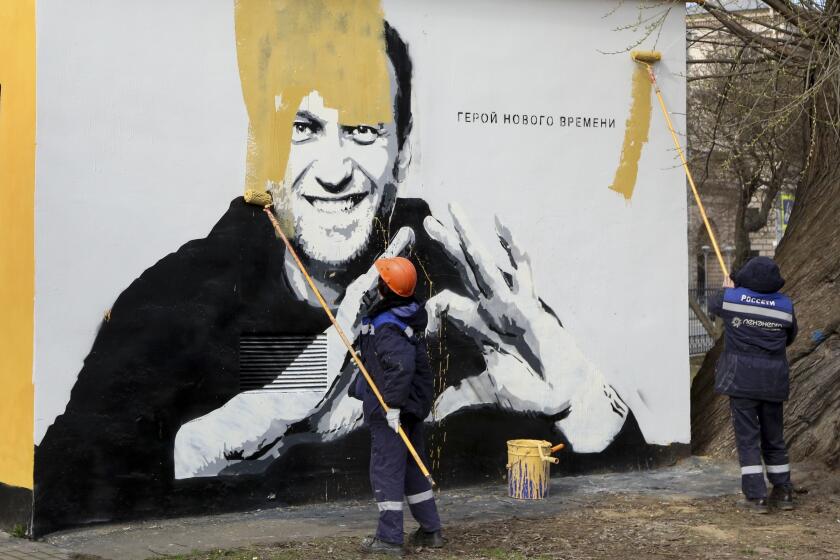Op-Ed: Governments are coming for Big Tech. Here’s what it could mean for your rights online

- Share via
Around the world, governments are challenging the immense power of Big Tech, causing politically motivated showdowns between their officials and tech companies to become increasingly commonplace.
In mid-September, just as voting began in Russia’s parliamentary elections, Apple and Google capitulated to ongoing government demands to remove from their online stores a smartphone app created by allies of opposition leader Alexei Navalny. To channel support away from the Kremlin’s preferred candidate, the app improved strategic coordination among voters and advised them about which candidates were most likely to defeat those backed by the ruling party.
The companies’ alarming decision fits a larger, global pattern. Governments around the world are increasingly wielding their regulatory power to subdue free expression online and gain greater access to private information. To respond to the immense power of the tech industry without emboldening digital repression by the state, regulations must make human rights and democratic values a priority.
The use of regulation for political ends was on full display in Russia, as state authorities coerced the two California-based tech titans into censorship amid tightly controlled elections, limiting the ability of opponents of Vladimir Putin’s government to organize.
Set against the backdrop of an 11-year decline in global internet freedom and a 15-year decline in overall democratic rights worldwide — as identified in Freedom House’s research — the question of how much and what kind of regulatory power governments should have over technology companies is both urgent and delicate.
In a recently released Freedom House report on internet freedom, we found that 48 of 70 countries surveyed pursued at least one form of regulatory action on online content, personal data or competition against technology firms over the last year. More than a dozen new laws threaten the future of free expression online. More governments are pressuring companies to remove broad swaths of content, often under the pretext of protecting users from misinformation, incitement to hatred or material that is harmful to minors. Their true aim is to suppress anti-government speech, investigative reporting and expressions of LGBTQ+ identity and other posts that may be politically disfavored.
Some government leaders have taken the opposite tack and attempted to ban platforms from moderating content, which could allow for the proliferation of false or hateful propaganda and threats of violence to drown out authentic discussion and debate. Only in a few cases do laws require companies to be more transparent over their content moderation, advertising practices and use of algorithms, and provide content producers with an avenue for appeal when their content is restricted.
Russian authorities have opened a case against imprisoned opposition leader Alexei Navalny and his allies, accusing them of forming an extremist group.
Dozens of laws introduced to regulate corporate data management are also ripe for government exploitation. Many require companies to undermine end-to-end encryption — a security method that prevents data from being accessed by anyone other than sender and recipient — in their products, or mandate that user data be stored on servers located within the country. In practice, weakened encryption and domestic data storage expand government ability to access people’s most intimate information. Even laws that ostensibly enshrine the rights of users to control their data often contain vague surveillance exemptions for national security.
More positively, industry regulators around the globe have also displayed a zeal for cracking down on anti-competitive and abusive commercial practices, and for fining major tech firms for failing to protect data and exploiting their market power. A few countries, such as Germany, have introduced measures that would prohibit companies from denying interoperability and data portability.
But competition policy also can be crafted and used for political gain. For instance, Chinese regulators have been among the most aggressive in addressing monopolistic practices by the country’s tech giants. However, their interventions — such as forced company restructurings and politicized pressure on business leaders — have raised concerns that the government is more interested in reining in these companies’ autonomy and influence than in fair competition and consumer protection.
The global drive to control Big Tech is occurring in tandem with a historic crackdown on internet freedom. In 56 of the countries covered by our report, officials arrested or convicted people for their online speech over the last year.
Governments suspended internet access in at least 20 countries, and 21 others blocked access to social media platforms, most often during times of political turmoil such as protests and elections. Authorities in at least 45 countries are suspected of obtaining spyware or data-extraction technology from private vendors, giving themselves unprecedented, extrajudicial access to private communications.
Some of the most illustrative cases of digital repression in the last year occurred in Myanmar, Belarus and Uganda, where electoral disputes led officials to shut off internet service, censor social media platforms and independent digital news outlets, and physically assault internet users.
With so many aspects of our lives moving online, new internet regulations are likely to have a lasting impact on our ability to express ourselves freely, share information across borders and hold the powerful to account.
We need to ensure that regulation does not become a tool for governments around the world to exert greater control over the digital sphere. Advocates for a free and open internet — including those from governments, civil society and the private sector — should push for new laws that prevent power from accumulating in the hands of a few dominant players, whether in the private sector or the state. That means making free expression a priority in content moderation and requiring platforms to be far more transparent and accountable when they do remove speech.
Data privacy laws should provide users with control over their information, institute safeguards against government surveillance and protect encryption. And policies that govern competition should foster innovation to allow people to make informed decisions about their online experiences.
Regulation is not a panacea, but well-designed rules and incentives can ensure the internet retains its emancipatory power, with all its potential to drive personal and societal progress.
Adrian Shahbaz is director for technology and democracy at Freedom House. Allie Funk is senior research analyst for technology and democracy at Freedom House. They are co-authors of “Freedom on the Net 2021: The Global Drive to Control Big Tech.”
More to Read
A cure for the common opinion
Get thought-provoking perspectives with our weekly newsletter.
You may occasionally receive promotional content from the Los Angeles Times.











